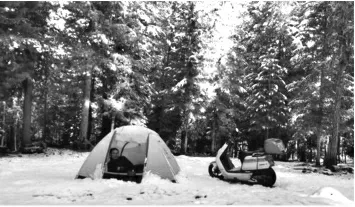河南焦作市第十二中学 靳佳佳
一辆电动车,带他走遍中国,穿越夏天、秋天和冬天,从田野到雪山,从平原到高原……

题材体裁 文章词数 建议用时约407 8分钟旅行 记叙文
难词探意
1. perch /pзːtʃ/ v. 停留
2. hospitable /hɒ΄spɪtəbl/ adj. 好客的
3. bun /bʌn/ n. 圆形的小面包或点心
4. generator /΄dʒenəreɪtə(r)/ n. 发电机

When your destiny is the road less traveled then excitement and adventure is your destination. Zhou Xiaobing, 35,was back in Shanghai in late May after a bittersweet 261-day journey on an electric motorcycle.
He traveled through summer, fall and winter, from fields to snow-covered mountains, from plains to plateaus. He visited Rongpo Monastery, perched at an altitude of about 5,100 metres, to see Qomolangma, known as Mount Everest in the West. He went camping at one of the coldest places in the country, where the temperature can sometimes drop to -41℃during the night. He went camping at well-chosen sites to get close to nature. In January, Zhou arrived at Genhe City, Inner Mongolia. He set up his tent there to experience the extreme cold. He kept himself warm and wind-proofed with professional outdoor apparel in daytime, and used three sleeping bags and other items at night when the temperature could drop as low as -41℃.
The scenery from Tibet to Xinjiang deeply impressed him. “I would go for days without seeing anyone else on the road. At an altitude of about 4,500 metres, I slept on the vehicle. When I woke up an hour later, I was still alone. It was the most lonely moment of my life,” he says. So, when he did meet people, he would enjoy making friends and would actively chat with others on the road. He occasionally traveled with some companions.
Zhou was moved that many strangers extended a helping hand, especially the hospitable people of local ethnic groups. In remote regions, Zhou stayed with them, offering him an opportunity to learn about local customs and dining habits. “At a Tibetan's home in Sichuan Province, I was expecting local dishes, such as yak meat, but I was served with rice, fried dishes and steamed buns. I then realized that they especially made these typical dishes for me as a guest,” he says. In Xinjiang, he arrived at a place guarded by a group of armed police, who allowed him to stay overnight, as there were no hotels nearby.
From Tibet to Xinjiang, he passed by an area that extended about 1,500 km, where locals rely on solar power and generators for electricity. Once he stayed overnight at the home of a Kazak family in a remote village in Xinjiang where there was a power cut, and the hostess cooked noodles for him by the light of a candle.
Reading Check
1. How long does Zhou's journey last?
A. About three months. B. About five months.
C. About nine months. D. About eleven months.
2. What can we know about Zhou from the second paragraph?
A. He traveled through autumn and winter.
B. He once camped at one of the coldest places in China.
C. He visited Rongpo Monastery to experience the cold.
D. He kept warm by doing outdoor activities frequently.
3. How did Zhou feel when meeting people on the road?
A. Delighted. B. Scared.
C. Confident. D. Confused.
4. What was Zhou mostly touched by?
A. Support from his family members.
B. His friends' company on the road.
C. Selfless help from strangers.
D. Guidance from wild animals.
Language Study
Sentence for writing
He went camping at one of the coldest places in the country, where the temperature can sometimes drop to -41℃during the night.
【信息提取】“one of +最高级+复数名词”表示“最……之一”。
【句式仿写】他成了他那个时期最着名的演员之一。



